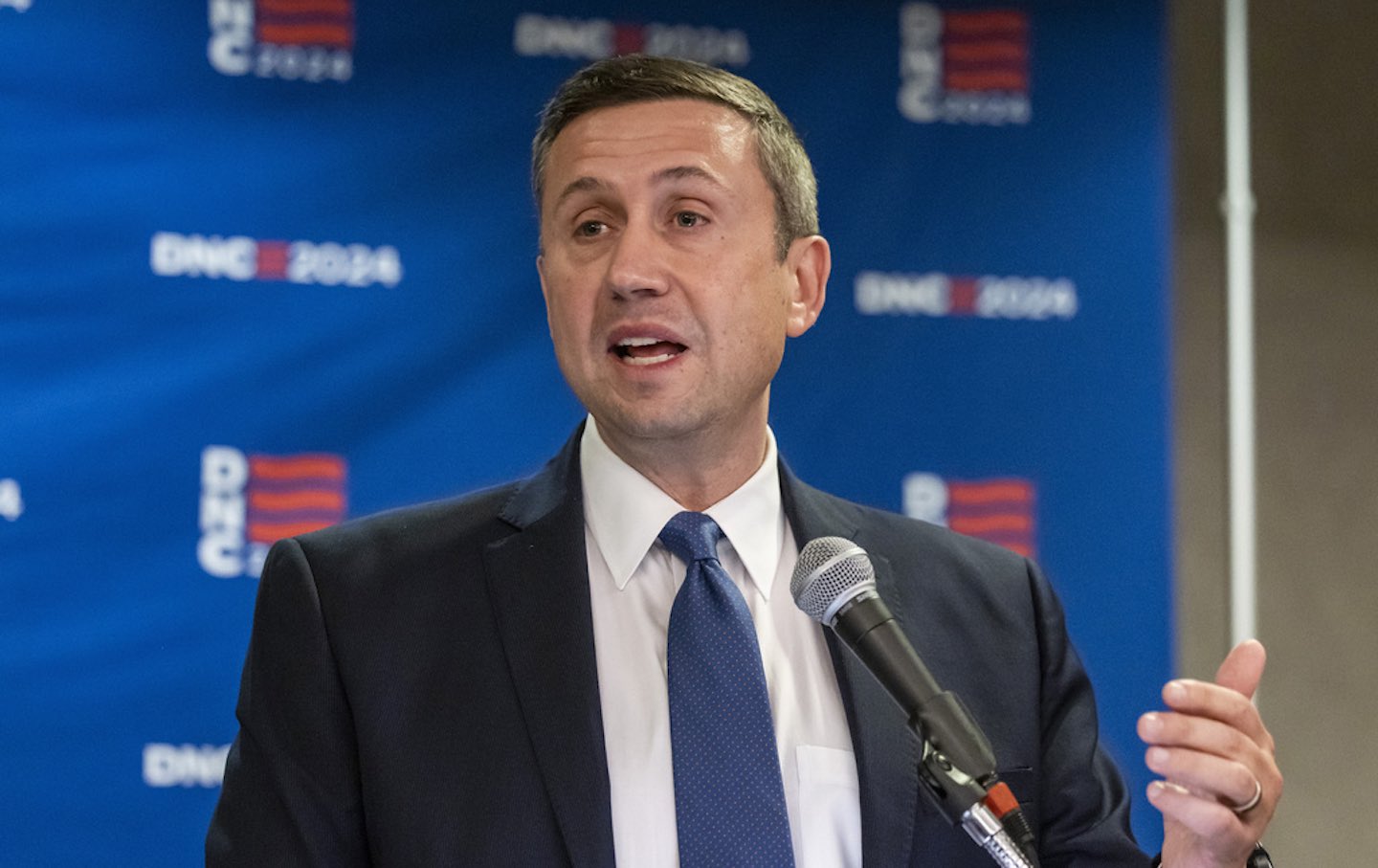Democrats Are Greenlighting Trump’s Crypto Corruption
Sixteen senators backed a disastrous bill that enshrines the crypto industry’s flagrant abuses into law.

Senator Kirsten Gillibrand speaks during the DC Blockchain Summit in Washington, DC, on Wednesday, March 26, 2025.
(Kent Nishimura / Bloomberg via Getty Images)When President Donald Trump convenes his private dinner to reward backers of his personal cryptocurrency this week, the celebrants will revel in more than just their corrupt access to the highest office in the land. They’ll also be cheering the fact that, on Monday night, the US Senate overwhelmingly endorsed a procedural measure to advance the disastrous Guiding and Establishing National Innovation for US Stablecoins Act, which despite its leaden and content-challenged title, is known as the GENIUS Act.
The vote came just 11 days after Senate Democrats, in a rare outbreak of vertebrate-adjacent conduct, voted down a similar bill, citing its failure to rein in the sort of brazen corruption exemplified by Trump’s crypto banquet. Yet anyone supposing that the Democratic caucus then persuaded the bill’s GOP sponsors to adopt new language to prevent crypto transactions from doubling as executive branch bribes would of course be mistaken. The revised GENIUS Act does contain new provisions to bolster consumer safeguards, limit the ability of tech companies to issue proprietary stablecoins, and extend new ethics for “special government employees” such as clueless DOGE thug Elon Musk and the Trump administration’s own crypto and AI czar David Sacks.
Critics called tweaks cosmetic at best, with Elizabeth Warren of Massachusetts warning that the bill’s “basic flaws remain unaddressed.” But they were enough to swing 16 Democratic senators over to support the bill—including marquee recipients of crypto campaign donations such as Kirsten Gillibrand of New York, Ruben Gallego of Arizona, Angela Alsobrooks of Maryland, Corey Booker of New Jersey, and Mark Warner of Virginia. The Senate’s final bill is now on course to pass sometime around the Memorial Day holiday. Tellingly, the caucus’s top two Democrats, minority leader Chuck Schumer of New York and whip Dick Durbin of Illinois, voted against the cloture motion—underlining how completely the GENIUS Act is a product of moneyed influence. As Jacob Silverman reported in his recent Nation feature on crypto’s takeover of US politics, the industry was the largest single source of campaign donations during the 2024 campaign cycle, with more than $197 million in contributions.
Prior to Monday’s vote, the industry advocacy group Stand With Crypto announced that it would count the proceeding as a “key vote” for its legislative scorecard—a far from subtle signal to lawmakers that campaign cash would be contingent on their votes. Per Bloomberg reporter Steve Dennis, Democrats in Congress landed $10 million in donations from crypto sources during last year’s campaign cycle, but the more eye-popping figure is what the industry spent to defeat critics of the scam currency: In Ohio’s Senate race, the industry devoted $40 million to defeating Democratic incumbent Sherrod Brown and replacing him with enthusiastic crypto tout Bernie Moreno. Crypto donors also bragged about their decisive role in helping to unseat House detractors such as New York Representative Jamaal Bowman and California Representative Katie Porter. As Illinois Democratic Representative Sean Casten told Silverman in regard to an earlier House vote on a bad crypto bill, “I didn’t find a single Democrat who disagreed with me that this CRA [Congressional Review Act vote] was terrible policy. No one pushed back on it. But I heard a lot of them saying, ‘Look, you know I’m in a vulnerable seat. I don’t want to have a bunch of crypto money [donated to my opponent]. That’s really scary.”
There’s no doubt that the crypto sector’s outsize donor profile concentrates the mind of a timorous Democratic senator wonderfully. And it’s equally clear that the industry is getting its money’s worth. The revised GENIUS Act, despite the symbolic (and mostly laughable) effort to bring special government employees under the reach of basic ethics standards in crypto transactions, endorses a stunning new level of financial corruption in the Oval Office, basically empowering a sitting president with the authority to grant favors to an industry he is lavishly cashing in on. The stablecoin USD1, marketed by the Trump-aligned crypto concern World Liberty, has reached a $2 billion valuation since it was introduced in March, mostly on the support of a crypto firm based in Abu Dhabi. On the heels of widespread congressional criticism of Trump’s shady agreement to let Qatar grant him a new luxe aircraft to serve as Air Force One, the caving of Senate Democrats on the GENIUS Act once more renders the party’s moral posturing on issues of moneyed corruption an absurdist pantomime.
Nor is the auctioning of presidential access the only glaring weakness of the GENIUS Act. Since its founding, the crypto industry has been a ready outlet for foreign money laundering, terrorist funding, and general illegality. The Senate bill offers no functional curbs on these abuses. As Warren, the ranking member on the Senate Banking Committee, said during floor debate over the GENIUS Act, “A bill that turbocharges the stablecoin market, while facilitating the president’s corruption and undermining national security, financial stability, and consumer protection is worse than no bill at all.”
Senate Democratic supporters mostly parried such complaints with rote invocations of crypto’s innovative prowess and historical inevitability. Warner delivered a Susan Collins–esque refrain about his “very real concerns” over rampant Trumpian corruption in the crypto sphere, but briskly segued into this chorus of industry-sponsored mush: “But we cannot allow that corruption to blind us to the broader reality: Blockchain technology is here to stay.” “I’m confident that we have produced a strong regulatory framework that will position our country for the future,” Gillibrand, the bill’s Democratic cosponsor, likewise burbled.
But as Warren also noted in her floor speech, we’ve heard this kind of talk before from the financial industry’s leased courtiers on Capitol Hill. Back in 1999, another bipartisan coalition endorsed the Gramm-Leach-Bliley Act, which overturned baseline protections against banking-sector speculation enacted during the New Deal, unleashing derivatives trading on Wall Street on an unprecedented scale. Less than a decade later, the global economy crashed in a riot of valueless asset swaps. “This is not the first time Congress listened to the financial industry and created a weak regulatory regime for a new, innovative financial product,” Warren announced. “We’ve seen this story before, and we know how it ends.” That lamentable bit of bipartisan legislative handiwork went by the name of the Financial Services Modernization Act. All that’s really changed since then is that the Senate’s lickspittle servants of capital have, against all odds, grown arrogant enough to style themselves geniuses.








